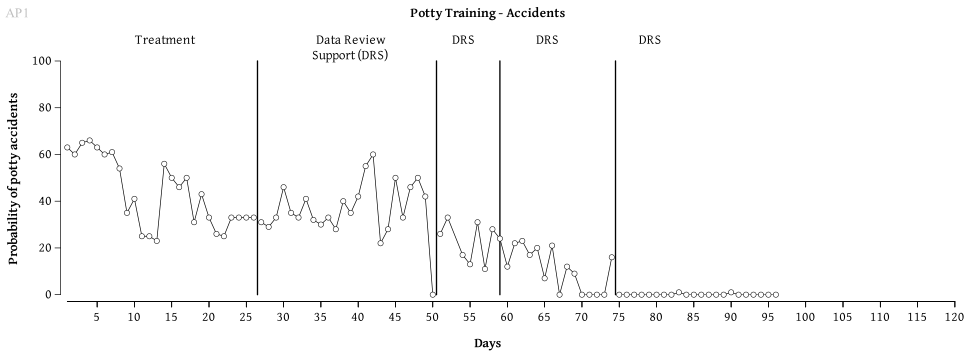Potty training
Why is potty training taking so long?
Potty training is a crucial skill that every child needs. It can also be a laborious task when teaching a child with developmental challenges. For example, typically developing children between ages 3 and 4 years old can control both bladder and bowel movements and leave diapers behind. However, the task of potty training some children with developmental challenges might seem like an endless struggle with no hope in sight. After years of unsuccessful attempts, many parents believe their child cannot learn or lack the ability to be aware of the bodily functions that signal the need to go to the bathroom.
At Core Behavior Skills, we use evidence-based practices to help families succeed with such a daunting task. On average, it takes anywhere from 1 to approximately 150 days to successfully potty train a child with developmental challenges. To put it into perspective, consider the following case study of a family that saw no hope in sight after 4 years of trying to potty train their child (5 yrs old).
Figure 1 below illustrates the challenges and difficulties of implementing a potty training routine and the importance of believing that the child is capable of learning and overcoming any barriers present.
Within the first five days of treatment, there was still approximately a 60% chance of an accident. The treatment phase was difficult and the Core Behavior Skills team guided the parent and reviewed data collected with the parent. Some days were brutal and lacked poor fidelity in treatment implementation.
Within the first 25 days of treatment, the probability of an accident happening dropped to about 35% chance. From day 40 to day 48, it seemed as if the probability of an accident would remain constant, however, what was important was how quickly the family was able to recover and get back on track. The next phases were then focused on data reviews, implementation adjustments, and providing the family with additional support and motivation to keep going as evident of the percentage of accidents continued to decrease. Due to this, by day 70, the percent chance dropped to about 0%, with accidents rarely occurring after that.
Figure 1: Our team tracked the probability of a potty accident for a particular child over time.

Potty training is difficult and the most important aspect is to believe that you as a parent can help your child overcome any barriers holding them back. Most ABA treatment designs begin with a baseline before implementing treatment. However, sufficient information was gathered and the parents received training and guidance to implement the potty training program from the Core Behavior Skills team.
From the very beginning, it was made clear that we would only guide the parents; this means that they would be responsible for changing the child and implementing the program. Success would depend on their ability, to be honest, open, and implement the program to the best of their ability. If parents waiver or lie about any challenges, difficulties, or the data itself, it would be a failure on their behalf to help their child succeed. It is normal to experience challenges and difficulties along the way. Changing problem behaviors can be exhausting at times. But being honest and open can create a more comprehensive understanding of the problems at hand. This is a typical expectation that Core Behavior Skills places on all caregivers.
If your child needs help with potty training, call us at 813-534-0462 or email us at info@corebehaviorskills.com to receive more information on how we can help you.
